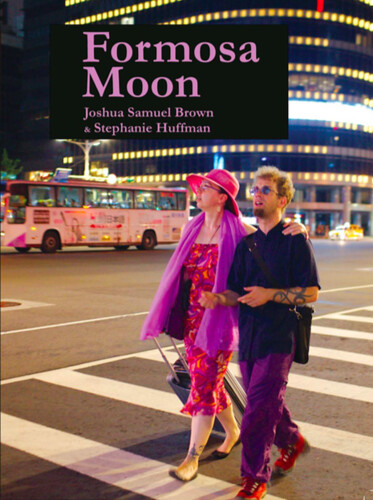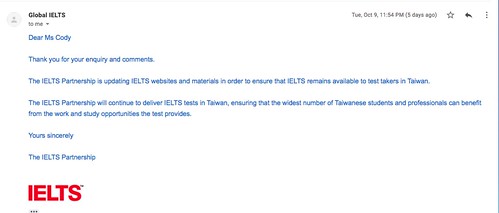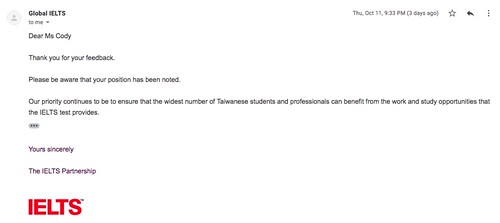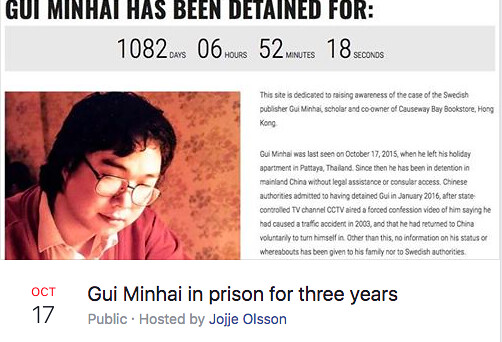Monday, October 22, 2018
You don't adopt Taiwan, Taiwan adopts you: a book review of Formosa Moon
I used to believe that I’d adopted Taiwan, but the truth is, Taiwan adopted me, taking me in when I was in my early twenties and giving me a series of increasingly interesting reasons to stick around....Six months ago, I brought the love of my life to Taiwan. The idea was ostensibly to convince her to love Taiwan much in the way that I did. In this I believe I’ve met with some success.
- Joshua Samuel Brown, Formosa Moon
(by Joshua Samuel Brown and Stephanie Huffman, ThingsAsian Press, 2018 - buy it here - and if you're in Taipei, there's a launch party this weekend)
I've heard people say that the best travel writing to read is about places you've never been: places foreign and "exotic" (how I hate that word) that you know next to nothing about, but come to understand in some small way through a guided journey by the author. If I'd ever quite bought into that, Formosa Moon cured me of it, reminding me that there is an earthier satisfaction in reading other peoples' experiences in places you know well.
Although none of the places mentioned in Formosa Moon were new to me (well, some of the hotels and restaurants mentioned were, such as the Dive Cube hotel), there's a certain beauty in reading about a place you're so familiar with that you can smell the air, see the details of the parks and unkempt sidewalks, picture the mountains, know intimately what kind of trees are growing all around and what it's like to live your life in a series of tiled buildings.
A section of the book takes place at Sun Moon Lake. Been there, didn't love it. Another one describes National Chengchi University. My sister studied there for a year. The Dome of Light? I was there two weeks ago. Tainan? I go every time I get the chance. Jiaoxi? Several visits, soaked in the public hot spring too. Huwei? I'm one of the few foreigners who went to Yunlin for fun over a Dragon Boat weekend just to see what it was like.
But there's something deeper about Formosa Moon that I just get. I think pretty much everyone who's made a life here - that is to say, many if not most of my closest friends at this point - understand as well. Taiwan is like a cat: you don't adopt a cat. A cat adopts you.
You might come here thinking you're going to just "go abroad for a few years" and do that privileged First World thing by teaching English to fund your time in Asia (you're probably not an actual English teacher). You might stay for 1, 2, 3 years: most of the cram school crowd seems to turn over in roughly those increments. Some of you won't get it: the traffic - there are traffic laws, I swear - the pollution, the ugly buildings (you will almost certainly live in one of these), the humidity, the long or weird working hours and greatly reduced career options, the crowds will all collude to gently push you out. Or maybe none of them will, and you'll enjoy your time here just fine, but when the clock is up it's up, and you were always going to return to the place you know is home anyway. Taiwan didn't adopt you. That's OK.
Some of you will fall in love here, or find your groove, or take an interest in Taiwan's unique history, or build a community. Or it'll be the damp hills, the palm trees, the local aunties, the 7-11s, the traditional markets. Or you'll watch a major social movement unfold up close and realize Taiwan is a place and a cause worth fighting for. Something about life here will speak to something inside you, and you'll stay. You probably didn't consciously choose to. You were adopted.
In this way, I found it appropriate that Formosa Moon heavily featured cats, though they popped up in the narrative for no particular reason, and certainly not in any planned thematic way. It just did. From the cats of Houtong (another place I know well, and have started hikes from) to the painted cats (among other fantastic creatures) of Rainbow Grandpa to Joshua's friend's cats which provided a cozy sense of home to Stephanie - the other writer of the book - I found the unexpected feline leitmotif to fit. Taiwan not only adopts you like a cat (or it doesn't), but it can be as cool, beguiling or mercurial as a cat, or as winsome and homey as one too. You know your cat loves you, but you're never quite sure how much.
Or, to put it another way:
Taiwan is kind, to its native born, adopted children, and short-term guests alike. But Taiwan doesn’t change its tempo for you. Instead, you must change your tempo to adapt to Taiwan. And this will make all the difference.
Of course, you get to wax lyrical about all of this because you chose to come for reasons other than making a basic living. Supporting yourself may have had something to do with it, but you could have done that where you'd come from. You're aware that exponentially larger numbers of foreign residents in Taiwan had no such privilege. (You are aware of that, yes?)
All this is not to say that only those who know Taiwan should read Formosa Moon. I'll certainly recommend - if not outright purchase as gifts - copies of the book for loved ones back home who perhaps don't get it, most of whom because they've never visited. It describes the country well, and even the pictures (which are very "homey", not glossy professional shots, which I see as a plus) show in accurate detail what life in Taiwan is like.
As the book itself points out, cities like Kyoto (or Shanghai or Singapore or these days, Seoul) beckon to the Western traveler who is planning their first trip to Asia. Most travelers don't think of "Asia" and immediately think "Taipei". So they don't come, and therefore, they don't know. Formosa Moon, I hope, might tempt some of them into finally visiting to see for themselves why I've chosen to stay for most of my adult life.
And not only that, I'll recommend it for its unique perspective. Every other piece of Taiwan-focused travel writing on my bookshelf is by a white guy. I haven't cracked them all yet, but will. I'm sure they'll be fantastic; people whose opinions I trust have told me so. But, so much travel writing is done by white guys hitting the trail alone, and other narrative voices enrich the genre. I don't think I've seen a travelogue written by two partners in a relationship before, each with views that play off or add depth to the other.
As someone who also moved to Taiwan and then six months later convinced the love of my life to move here too, that appeals to me - as a woman and a person in a committed relationship. Ours took a slightly different route: he didn't know he was the love of my life when he moved here (I kind of did, but didn't tell him so right off), and our relationship evolved here, not in the US. I didn't "love Taiwan" when he moved here: my first six months here weren't that great, to be honest. I am sure I have had success, however, in convincing him to love this country as much as I do. We show it in different ways, but I know.
More poignantly, Formosa Moon captures what it's like to be both in a relationship with a person, and with a country. We never had to face the challenge of Brendan liking Taiwan; he did immediately, on his first visit here. I wasn't sure then how much I liked Taiwan: I didn't decide to make the commitment until three years later. That was when I'd been planning to decide if I'd stay or go; it also happened to be the year we got married. I suppose our somewhat weirdly polyamorous love grew together.
Of course there's a bittersweetness to every love story. You know how they say that in a relationship, someone always loves more, and the other less? And the one who loves less has all the power?
Although I know I can never truly be "a local" (forget not looking the part: it's just not my native culture), I want to stay and advocate for Taiwan, and gain legal rights - not just privileges accorded me out of courtesy as a permanent resident, which can be revoked. I don't expect a perfect life here. It would be nice, however, if in my relationship with Taiwan I didn't always feel like I was the one who loved more. I like to think that by opening myself up to Taiwan, that Taiwan has opened to me a little. I'll never know how much, though.
I'll end, then, on a particular salient quote from co-Stephanie Huffman:
Taiwan and I were certainly friends but had we really progressed to a love state? I didn’t know even know how Taiwan felt about me and I certainly wanted some indication of her feelings before I made any commitments.
Yup. Except I did that thing that relationship advice columnists say never to do: I made the commitment without knowing quite how she felt about me.
Still here though. You see, I was adopted.
Saturday, October 20, 2018
Why is everyone so upset that Ko said Taiwan is a "product on a shelf"?
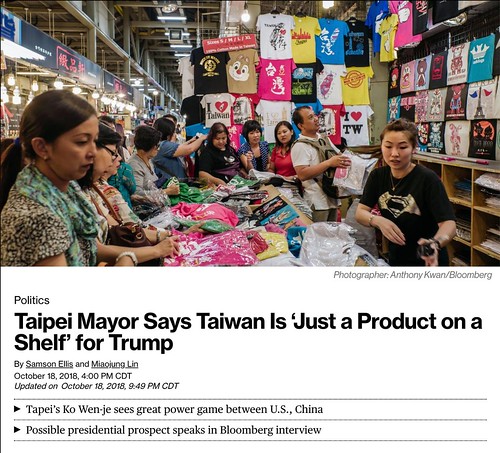 |
| The screenshot that launched a million words |
Because I'm gonna say it: he's right.
Taiwan must focus on making itself more valuable to President Donald Trump and accept its status as a pawn in the great power game between the U.S. and China, Taipei Mayor Ko Wen-je said.
Nobody likes to hear that they "must accept their status as a pawn" - but that doesn't make it untrue. We absolutely should not overestimate the US's willingness to defend Taiwan.
And he's not only right about Donald Trump, who is absolutely not a reliable ally to anyone and sees everything as an opportunity that can bolster his own self-image or worth or a threat to be eradicated (or at least shouted at incoherently), he's also right about the US in general. Not only that, it's been true for awhile.
This doesn't mean Taiwan shouldn't deal with the US, or should refuse its help, but that's not what Ko said: he said we needed a strategy to deal with this reality. That's just a correct statement.
But it seemed as though nobody wanted to hear it. What struck me was the swiftness and absolute horror of the reaction from Taiwanese activists, commentators, friends and other people involved in the struggle for a better Taiwan. The general feeling seemed to be, essentially "how could he say such a thing?"
I was a bit curious about that so I asked around, paid attention to various comment threads (like this one) on the topic, and generally just tried to get a sense of what was so terrible about essentially making an accurate, if damning, statement about the US's commitment to Taiwan.
The main point of anger doesn't seem to be the idea that Taiwan is a "pawn", but that the Ko has not equally addressed the fact that if Taiwan is a poker chip to the US, then it's also one to China. Essentially, he's speaking out about how the US sees Taiwan, but is seen by the public as worryingly - and oddly - growing closer to China.
There's a sense among many Taiwanese that Ko has questionable motives, from using China's language on two sides of the strait being "one family" to gaining Chinese state television endorsements to rumors that China is encouraging Taishang (Taiwanese businesspeople in China) to return to vote for Ko and is supporting him for a 2020 presidential run on the assumption that the KMT can't win, with Ko himself not doing much to dispel these notions. I've even heard rumors about some deeply weird cross-party alliances that...well, I won't even go there.
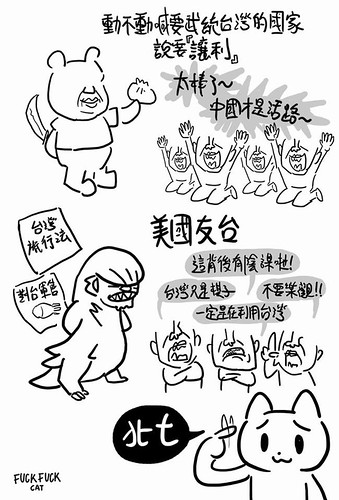 |
| From 幹幹貓: probably one of the most common things I read to improve my colloquial Chinese. It's all in Mandarin but you should check it out! |
There's also the general sentiment - captured in the Fuck Fuck Cat cartoon above - that so many Taiwanese voters and politicians are willing to bend over for China at a few sweet words promising economic incentives, ignoring China's stated and obvious intentions. These (often same) people will blast the US-Taiwan relationship as something they can't trust, despite all sorts of actually good things the US has done, from the Taiwan Travel Act to arms sales, without anything close to the ill intent of China.
So it makes sense from their perspective to worry that he'd be so dismissive of Taiwan as a commodity of the US, but silent on how China views Taiwan.
I get that too - here he basically says there is no such thing as "cross-strait relations": one could charitably parse that as "China is a foreign country like any other", but I can see how someone might hear it as "cross-strait relations don't exist because we're all the same" given some of his language choices in the past.
He goes on, however, to basically speak truth to power: saying that Trump has repeated "America First!" ad nauseam, and it's foolish to not believe him. When one reporter said "but some are insisting that you really shouldn't say 'Taiwan is just a product'", he replied, basically, "I dunno, what else am I supposed to say?"
Which...yeah.
I'm sure there are people under Trump who care about Taiwan as more than a 'product', and they've had enough say in the US's recent Taiwan policy that we've seen some real benefits. But an entire book could be written on how past administrations have seen Taiwan as a poker chip - from Bush speaking out against Taiwan independence in 2003 to Obama "selling so few arms to Taiwan that he came close to violating the Taiwan Relations Act", as a friend once put it.
The Bloomberg piece that created this poopfest goes on to say:
The outspoken former surgeon and potential presidential contender told Bloomberg News that Taiwan shouldn’t overestimate the U.S.’s willingness to defend the island from an attack by its much bigger neighbor. Ko, 59, said Taiwan needed to boost its worth to America by strengthening shared values, such as democracy and economic transparency (emphasis mine).
Again, yeah. What reasonable person would argue with that?
I could argue that playing up values like 'shared democracy' wouldn't matter - the US has a history of ignoring human rights abuses, or responding flaccidly to them, when economic benefits might be at stake (including the US's response to Tiananmen Square after 1989). That doesn't mean we shouldn't make this a selling point for Taiwan, however.
But, this is apparently not good enough: there are all sorts of rumors about his having a role in organ harvesting (getting discounts on organs from China? Something like that. I'm not too clear), on the nature of his previous visits to China and other things I won't bother with.
I'm not saying I believe all of this - I'm just pointing out that this is what is being said.
Some of the above are clearly election season character-smearing trash or at best should be taken with a Tainan Salt Museum mountain of salt, yet a lot of the comments I've been seeing slamming Ko for calling Taiwan a "product on the shelf" for the US reference the above rumors as though they are fact, and therefore prove that Ko wants to move away from a stronger relationship with the US and towards a friendlier one with China. Of course, they prove no such thing.
I don't know. I see their point vis-a-vis China - I too have been disappointed with Ko's rhetoric in this area (though much more worried about his only serious opponent's even stronger pro-China talking points). I find it odd that he'd be so quick to abandon the base that voted him in, of not-quite-DPP pro-Taiwan voters and Sunflower-energized youth to start talking like a weird old unificationist, and yet, I remain agnostic on the notion that he actually is a unificationist. I also remain agnostic on the idea that he has some deep-level "four-dimensional chess" strategy going on to deal with China: the evidence doesn't support that, either.
And I've been deeply disappointed with some in the Taiwanese electorate who are willing to believe any and all claptrap from China, who really is our enemy, and then are so quick to turn around and criticize the US.
Anyway, I get it. We big-noses are talking about how Ko is "telling it like it is" because we're just thinking about his comments vis-a-vis the US, without looking at how they stack up to his comments about China. Removed from that context, we're right. Put back in context, however, I see why this angers a certain subset of Taiwanese.
Finally, there's a sentiment among some as well that Ko supporters are becoming overly rabid themselves - acting like extremists or fundamentalists, balking at the slightest criticism (I've seen this in action, by the way - it is, in some cases, a thing). Among Ko supporters, there's a sentiment that everyone knows the guy speaks bluntly and undiplomatically, and we all say we want politicians who say what they mean, so are you really going to crucify him every time he does exactly that?
And yet, I can't repeat it enough: when you strip all that away and look at US-Taiwan relations specifically, and ignore the rumors dogging Ko in other areas, you have to admit: he's absolutely right. Trump keeps repeating "America First" - and when people tell you who they are, believe them.
Thursday, October 18, 2018
Taiwanese teens know that their English classes are terrible
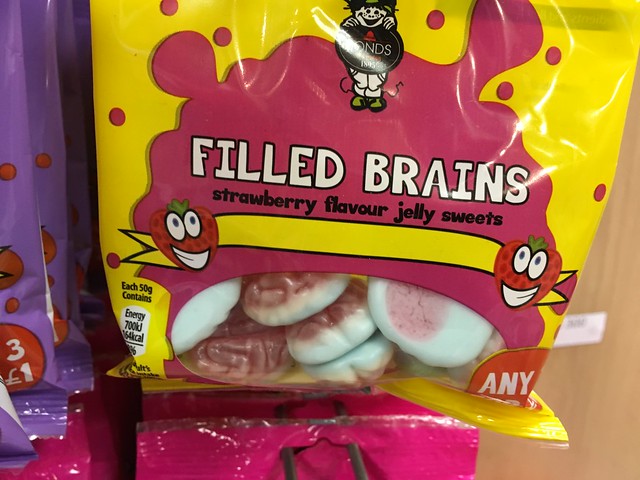
As an English teacher who believes in the power of authentic communication in language learning -after all, that's how I learned Mandarin - I've been following the work of Taipei Teen Tribune with interest. It's an English-language 'new media' website with articles written by Taiwanese teenagers, with a lot of really great content (and a useful site to follow if you want to know what Taiwanese youth are thinking). And as a professional, I'm interested in how it has helped Taiwanese youth to develop their English language proficiency.
Recently, 12th grader Irene Lin wrote this insightful piece about what it's like to learn English in Taiwanese schools. It goes something like this:
Many students, who are able to get high grades on tests, are incapable of having an actual English conversation nor write an
essay on their own. Lessons are designed for students to be able to answer grammar questions and fill vocabulary into sentences rather than practical usage.
Treating English like a math problem is the major flaw in Taiwan’s English education. Students are taught to look at a sentence by breaking them down into pieces based on parts of speech. Overemphasizing grammar and neglecting content causes students to misuse vocabulary and leads to a lack of ability to comprehend meaning.
Lin suggests a solution that pretty much every professional educator with solid training can get behind:
The amount of reading, writing, and speaking needs to increase to solve the problem. However, we not only need to increase the amount but also its difficulty. Students learn more vocabulary through a novel compared to a five paragraph text; learning to write an essay provides the opportunity to learn critical thinking, an ability that Taiwanese education has never taught.
The analysis itself could go deeper, but what is said is spot-on. I'd bend over and do backflips to have a student like this in my classes, and I don't even teach teenagers (I work with adults). Essentially, she's spot on that macroskills work needs to be increased by a massive amount, with an eye to creating users, not learners of the language. Taiwan's secondary school language curriculum currently focuses on passing the various national exams, which in turn are focused on a grammar-structure-heavy view of language.
It's a classic example of negative washback, and the effects are already well-known: while many Taiwanese English teachers are open to more communicative-competence oriented language teaching, only elementary school Taiwanese teachers of English feel they're able to actually incorporate this into their teaching. This is true even in Tainan, where "English as a second official language" has been a policy for a few years now: elementary school teachers are overall more enthusiastic than junior high school ones, almost certainly due to the pressure of preparing learners for national exams.
At the secondary level, teachers repeatedly say that the pressure to prepare learners for exams (which do not focus on communicative competence at all) keeps them from meaningfully incorporating learning approaches that are shown to produce competent users, not just test-takers.
There is just no way to incorporate anything like communicative teaching, task-based learning, a lexical approach or the Big Mama of bilingual education - CLIL, or Content Language Integrated Learning - at a national level as long as the teachers are still pinned to the wall vis-a-vis the national exams.
The exams themselves need to either be scrapped (at least the foreign language sections, though I'm of a mind to say the whole thing should go, with more proficiency-oriented assessment methods taking their place), or revamped so completely that they look nothing like what learners do now. There is just no place in modern language learning for pages and pages of grammar analysis without any nods to practical usage or even meaning in context.
There's just no other reasonable way to teach English for proficiency - you can't expect teachers to do that and to produce test-takers who can handle a grammar-heavy sit-down exam at the same time. The tests have got to go - but good luck convincing parents, some old-school teachers, and more conservative officials in the Ministry of Education that.
Certainly, meaningful skills and systems practice should be a part of any meaningful language-learning curriculum, but it's not enough to say "increase the difficulty." As other professional educators in Taiwan have noted when reading this, another big issue is that the ways in which language classes in Taiwanese schools are already difficult are not the ways that will produce proficient users of English.
For example, as a knowledgeable friend pointed out, there's a glut of vocabulary in the current curriculum - far too much to absorb in any real way. If the target language for each class is 4-5 new words at most - but those words are truly used in terms of collocation, colligation, common usage, presence in idiomatic speech and more, and strongly contextually presented, by the end of a typical Taiwanese student's education, they will have still learned thousands of words - more than enough to be proficient, if they can use them across several collocations and phrases. The difference is that they'll be more likely to actually remember what they learned, rather than trying to cram five times that many lexical items into their brains, vomiting it all up on tests, and then forgetting most of it soon after.
That Lin and her peers already know they're receiving a sub-standard language education is a start. That Lin is able to say clearly that her education does not teach her to think critically is, ironically, a sign of critical thinking ability. It gives me faith in the new generation, so I'll kindly thank you to stop calling them strawberries and mindless phone drones.
All of this leads right back to issues with making English a "second official language" in Taiwan.
The idea itself isn't a bad one, and the stated goals of the program are actually quite reasonable. The goal isn't to make everyone a fluent speaker, or even necessarily a fully proficient one. They're to make Taiwan a more navigable, understandable destination for foreign visitors and businesspeople - essentially, to internationalize. They're to make English less 'scary' (so, for example, maybe shop assistants won't run away when they see me because they're afraid to speak English; nevermind that I speak Mandarin), and to improve the English curriculum that Taiwan already has. The timeline is reasonable as well.
That said, the fact that Taiwanese youth already go through about a decade of English classes in school, and most who don't come out speaking English in any meaningful way (those who do have almost always taken additional after-school language classes) is a massive problem. Simply having more classes won't help if the curriculum is ineffective. But if the curriculum doesn't work because it's preparing learners for exams rather than teaching them to use a language, it can't be changed unless the exams change.
Tainan is already doing a good job with this on the tourist end, with improvements such as English audioguides now available for major temples, so that any visitor can take a self-guided English-language tour of a number of Tainan temples, and by all accounts the work is quality.
When it comes to improving actual education and proficiency, however, my big worry is that there's simply no way to know if it's working. There seems to be no assessment mechanism built into Tainan's program, which is a yellow (if not a red) flag itself. Even if there were, it's so new that we'd have no idea if it were working by how anyhow; it's too early to know. That Lai has announced the initiative at a national level now is pure politics.
These issues aside, the problem that Lin dances around in her piece is exactly the thing that I fear will torpedo the program: we have no idea whether the continued existence of the national exams in Tainan is having an effect on the "English as a second language" program there, because there's not only no data, but no mechanism that I know of to collect it. Now, imagine that problem on a national level. I just don't see how this is going to work unless we kill the test-heavy way languages are taught in Taiwan now.
That itself is hard to do unless we clean house in terms of the teachers and Ministry of Education officials who will fight such changes, and not just hire "more teachers", but implement improved training for those teachers (both foreign and local - the time is here when it comes to no longer allowing uncredentialed 'native speakers' to be hired as English teachers in Taiwan, with little or no institutional support or meaningful training once employed. Although that's how I got my start, the system simply has to change.) For foreign English teachers, insisting on an internationally-recognized certification - especially now that one will soon be available in Taiwan - and setting parameters for which certification programs are accepted is just a first step.
On top of that, an entirely new curriculum will have to be written, which challenges learners in appropriate ways. What it means to assess learning will have to be entirely re-vamped. Only through consulting with experienced, trained teachers can we ever hope to do this well.
Until that happens, we might be told that English education in Taiwan is going to change, but teachers will continue to prepare for the ludicrous national exams, and students like Irene Lin aren't going to see their language education get any better.
I'm not holding my breath.
Tuesday, October 16, 2018
IELTS takes a political position (and my ongoing battle to fight The Man)
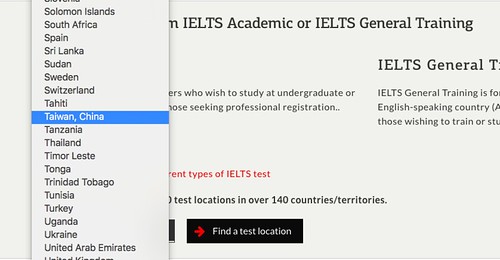 |
| Jerks. |
As my husband noted in his nail-on-the-head post on the same topic, pretty much every IELTS teacher and examiner we know is horrified by the change on IELTS's website of "Taiwan" to "Taiwan, China" (Notably, Hong Kong and Macau bear no such designation. If I didn't already know this was all about politics, I'd say that's odd).
Many of us have written to IELTS to protest the change, including me. I'd include a screenshot, except that e-mail contains references to the nature of my employment which I cannot divulge, but which when blacked out render the letter incoherent. Suffice it to say, it was an angry but basically formal letter of protest and complaint.
We all got the same completely irrelevant form letters in reply, which didn't actually address the issue we wrote about:
You can write to them too, by the way, their email is globalielts@ielts.org. See if you get the same bogus form letter! It'll be a fun international discourse comparison!
Of course, I wrote back to point out that their form letter reply was irrelevant to the protest lodged and got a snottier, though I suppose more relevant, reply:
This is where I got a little testy. I'd say "I have a short temper", but several days on I decided to send this anyway. It won't make a difference, so please enjoy it as a retort created for your entertainment:
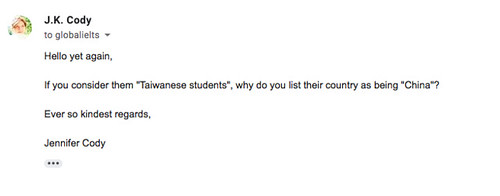 |
| "If you consider them 'Taiwanese students', why do you list their country as being 'China'?" |
Here's the thing. I know perfectly well that we're probably not going to win this, because The Man doesn't care about our tinny complaints. It pretends to be apolitical while taking a political, pro-Beijing position. And that is what you're doing when you list Taiwan as "Taiwan, China": you are taking a political position. You are saying Taiwan is a part of China, a position most Taiwanese do not agree with.
It's hard to fight the power, which as a friend pointed out, is the entire point of having power - so it's harder for people to fight you. IELTS pretends to be a dispassionate language proficiency test, but it's also a source of power: are you a non-native speaker who wants to study in the UK (or other countries) or get certain kinds of visas? You have to take it. It's tied to the government through British Council and the UKVI service. That's power. It's not just a test.
It wants to think it's not The Man, but it absolutely is. And as The Man almost always is, IELTS is wrong.
For me, this is the point at which "Taiwan, China" stops being an abstraction: it's not just an unfair, stupid thing that terrible companies do for money. It affects me personally: I'm associated with the brand. Some of my income comes from them. If I refuse to accept this, there is a real impact on my life, moreso than boycotting airlines or slagging off TOEFL. I don't earn money from those companies. I don't know how I can take dirty money now, so for the first time in a very long time, I'm faced with a choice between a chunk of my income, and my principles.
As China expands its forcefulness, more people like me will start facing that choice. I have to hope enough of them will choose principles, as I'm headed towards doing, but I know that many won't.
This isn't a small issue relegated to Taiwan and China. It affects people like me. It affects international workers and foreign residents.
And, as Brendan pointed out in his excellent post (which you should absolutely read), IELTS is essentially helping China accomplish its political goals, which serve as precursors to its military goals:
The government of the PRC would like nothing more than to take over Taiwan and incorporate it into their territory....This is not the ranting of a conspiracy monger -- China isn’t even trying to hide its intentions.
Whether China takes Taiwan by force or by “peaceful” coercion, it doesn’t want the rest of the world to see it as a larger country taking over a smaller, less powerful country. That would look very bad. Instead, China wants the rest of the world to see Taiwan as a recalcitrant part of China that needs to be brought to heel. That’s why (among many things) it’s got people pushing to change “Taiwan” on those drop-down menus to things like “Taiwan, China” or “Taiwan, Province of China”. It’s all about changing the world’s perception of Taiwan so that if Invasion Day comes, the rest of the world doesn’t see Xi Jinping as another Hitler invading Poland.
And every airline that lists Taiwan as China and every educational institution that forces students to declare their country as “Taiwan, China” is complicit in this. With Beijing -- not politically neutral.
I don't know how to fight that. I don't know how to tell you to fight that. I'm still weighing my options, although I know that not acting is not an option. I don't know what to tell my students, except not to take IELTS.
I know some Taiwan-based examiners read this blog. I know a lot of Taiwanese do, too. I don't know what to tell you.
I considered suggesting a strike, and still think that might be a possibility. I worry, however, that it will hurt local centers like IDP Taipei, who are not our enemies (I suspect a lot of the local employees of IELTS centers are on our side, in fact) without really hurting IELTS as a global organization. It might be our best shot, however, at getting this story to stay in the news and embarrass IELTS as much as possible.
I considered a petition, but TOEFL ignored the one directed at them, and IELTS will too. That's what The Man does - he ignores petitions, because he has power.
I considered saying you should change your scripts and say explicitly that Taiwan is NOT CHINA, but that could hurt candidates' performance and that's not fair. It's not their fault (even with the Chinese candidates, it's not their fault at all that their government sucks).
Of course I will continue to encourage Taiwanese students not to take the test.
Something more should be done, but the result has to hurt IELTS Global. What should that something be? I don't know yet. But I have no intention of going away and I have no intention of quietly choosing money over principles.
All I can say is that I encourage you to organize (and feel free to get in touch with me, by the way. I'm easy to find). Be creative, and don't back down. The Man usually wins, but that doesn't mean you have to sit down and obey meekly.
I wish I had better advice, though. I'm not sure what the next move will be, but I can assure you we're not done here.
Monday, October 15, 2018
Go see "Nude" in Kaohsiung - and Taiwan, promote your events better!
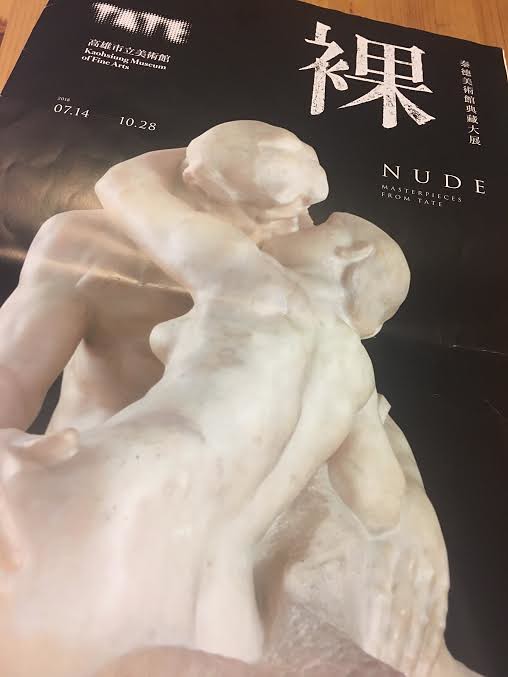 |
| Go see Nude! |
Last weekend, I had the good fortune to go to Kaohsiung for a few days to take part in a tourism-related conference. That part was interesting, but not something I feel the need to blog about.
Being down there, however, gave me the chance to see one of my oldest and closest friends in Taiwan. Helping to run the family business mean she doesn't have a lot of time to come to Taipei, so we often see each other when I'm able to head down south. For those of you who think I'm a public transit snob who won't grace an old-school Taiwanese scooter with her precious princess bum, I actually had a blast riding around Kaohsiung county (technically 'city' but that was a stupid change and I won't dignify it) and downtown on the back of her scooter. I just won't drive one myself, because I value my life.
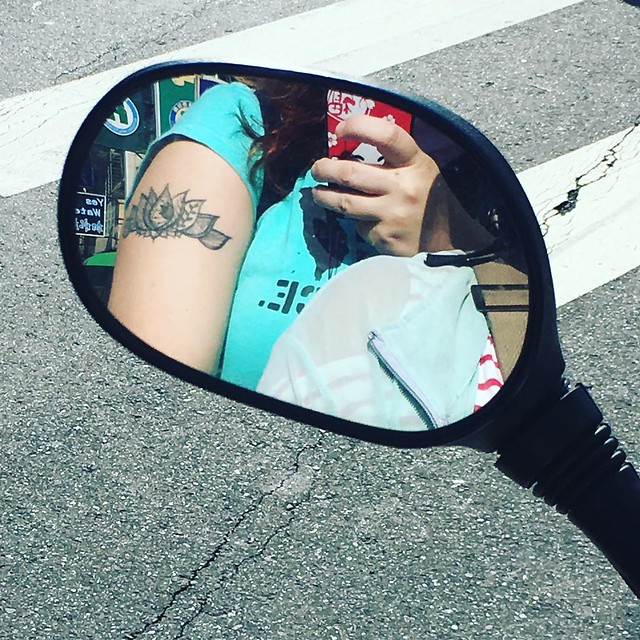
Anyway, we decided to check out the Kaohsiung Museum of Fine Art, which is currently hosting "Nude", an exhibit of works on loan from the Tate Modern in London.
The theme of the exhibit is nudity in modern art, and it discusses (with well-planned wall panels in English and Chinese) the evolution of nudity in art through the late 19th century to the modern era. It includes some stunning - and some head-scratching - cutting-edge modern work along side classics by Matisse, Rodin, Renoir and Picasso.
To be frank, it was just an amazing exhibit. It was fine art of a high calibre which is a real treat in Taiwan, with a smattering of well-known masters but not necessarily focusing only on the big names. It featured Rodin's Kiss, which is one of the great works of Western sculpture. The evening we went, a concert was being planned around it featuring modern works of classical music.
Photographs were not allowed, so you'll have to make do with a shot of the brochure and some postcards I purchased.
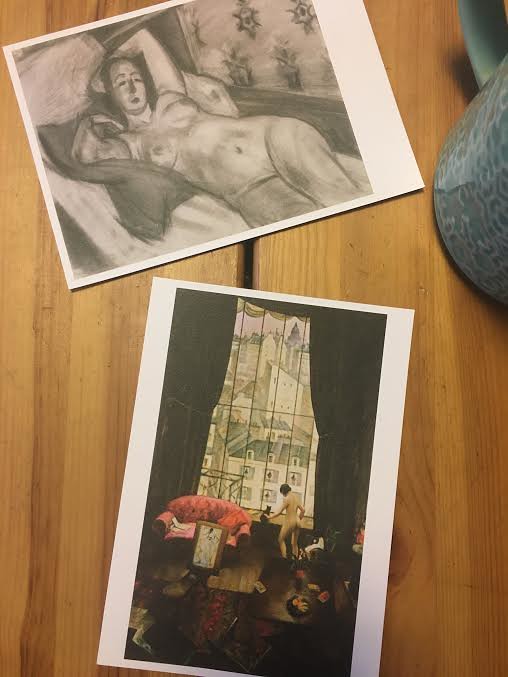 |
| A Matisse and a Nevinson |
The exhibit runs through October 28 and costs NT$280 (with concessions including a student discount), so you still have time. Go see it!
I mean, I was just in London. I went to the Tate Modern. I didn't get to see stuff this great there!
Here's what keeps nagging me: I had heard that this was taking place through the local grapevine, though it wasn't promoted in any way that made a huge impact on me. I had forgotten that it was still running, and in fact though I wouldn't get to see it as I was away for most of the summer. My local friend had to remind me that it was still an option.
When I got back to my hotel, I searched a bit to see where news of the exhibit could be found by tourists (plenty if information is available in Chinese, and the exhibit seemed to be locally popular, with the museum staying open until 8:30pm that Friday). A few articles from over the summer mentioned it, including the Focus Taiwan one linked above. After that, nothing.
A visitor searching for events in Kaohsiung in September or October (perhaps even August) would have trouble finding out that this exhibit existed, especially if they were a foreign tourist searching in English. The information is there, but it's hard to find for travelers. About to attend a conference on tourism promotion in Taiwan, this struck me as especially strange.
As a traveler in Kaohsiung - although a domestic one, as Taipei is my home - I was keen to see the exhibit, and yet would likely not have thought to go if not for my friend. And I actually had known about it! Imagine a foreign tourist here who hadn't seen any of the local news items featuring it when it opened. They'd have no idea.
Here's an example of what I mean. If you search for events in Kaohsiung, you might come across this website by the Kaohsiung City Government. It's actually a pretty good website in a variety of languages, which is already exceptional for Taiwan (where websites in English are often so terribly-designed, unclear and devoid of real information that they are essentially unusable and, I have to assume, only exist for decorative purposes or so that someone could give their nominally-English-speaking nephew a website development contract).
But if you actually search for events, say, this weekend, this is what you get:
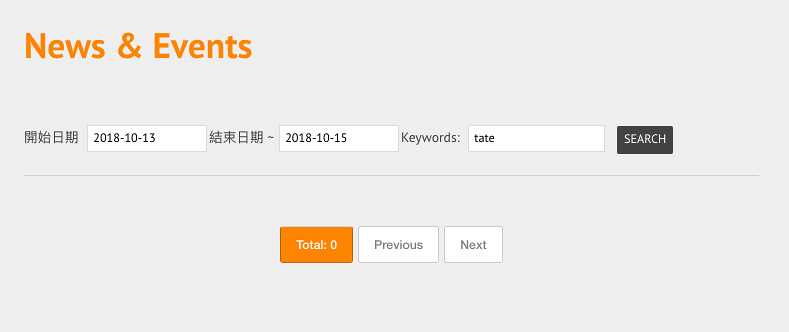 |
| Same thing for no keyword, "art", "museum" and "nude" |
Nothing.
Put in some keywords (I tried "museum", "art", "nude" and "tate") - still nothing. A tourist using this site would never have found the sublime exhibit I was lucky to see.
It really seems as though events in Taiwan are either heavily publicized but terrible, or great but not promoted well or consistently.
So, hey, Taiwan. You can do better. You have interesting events that travelers will want to know about. Make sure they do!
Sunday, October 14, 2018
Talk on Gui Minhai by Swedish journalist to be held on 10/17
Time: October 17 (this Wednesday), 7:30pm-9pm
台北市松山區復興北路181號12樓
Top-notch Swedish journalist Jojje Olsson will be hosting a talk on the disappearance and continued detainment of Swedish citizen Gui Minhai this Wednesday.
Olsson has been holding Sweden's feet to the fire over the government's silence on Chinese government crimes against Swedish citizens for some time, and is deeply knowledgeable about these issues. He is well worth listening to and I strongly recommend attending.
Gui's disappearance affects us all. First, it shows that the Chinese government is deeply racist: it is far more likely to go after dissidents of Chinese ancestral heritage, showing that it considers all people with ancestral ties to China to essentially be "Chinese" regardless of where they actually come from, live, or are citizens. China seems to have wagered that the rest of the world doesn't care as long as the victims look Asian. I fear that they have wagered correctly.
It also shows that China's actions are not just impacting their own citizens (although prominent Chinese citizens are disappearing as well, including ones who head prominent international organizations and do not reside in China, such as disappeared Interpol chief Meng Hongwei). Gui Minhai is a Swedish citizen; this issue also calls to mind Li Mingche, the Taiwanese citizen also 'disappeared' by China. Li, too, is not Chinese: he is Taiwanese, and his actions in Taiwan were entirely legal.
Even scarier is that Gui's disappearance did not happen in China - he was in Bangkok. Essentially, this means that the Chinese government does not stop at its own citizens or borders, and is certainly willing to abduct foreign nationals from other countries. It is possible - likely, even - that they attempted to do the same thing to Hong Kong democracy activist Joshua Wong when he arrived in Bangkok, but had to release him as he was able to get word of his detainment out on social media.
This is what we're up against. This shows that, as evil as you think Western countries can be (and they certainly can be), the CCP is several orders of magnitude worse: they are crueler, more evil, and more terrifying.
Knowing more about these issues, especially if you reside in Taiwan, is absolutely worth your time. Also, you'll be supporting one of the foreign journalists whose mission it is to expose Chinese government atrocities to Western audiences and who is committed to Taiwan. We need more of those, and to support the ones we already have.
Saturday, October 13, 2018
Don't Take IELTS (請拒考雅思)
 |
| Calling Taiwan "China" makes about as much sense as calling a horse a dog. Shame on you, IELTS. |
I'm still deeply upset as someone who has taught IELTS preparatory classes that the IELTS organization changed "Taiwan" to "Taiwan, China". I have quite a lot more to say about this, which I'll publish across two posts.
Right now, what I really want to say is that, as an IELTS teacher, I'm embarrassed to be associated with the brand. As a teacher who has advised her learners about proficiency tests in the past, I just can't with good conscience advise now that my learners take any test (TOEFL does the same thing, but I'm not a TOEFL teacher so I have less personally invested. They're slimy cowards for kowtowing to China too, though). My students deserve not to be humiliated just by registering.
To Taiwanese students, I say, don't take IELTS. Just...don't. I wish I had a better alternative, but I don't.
I considered writing this up for publication outside of my blog, but ultimately decided it was best published here, as it expresses a very personal opinion. That said, I do hope it reaches a wider audience, even though I feel as though this is a hopeless battle.
It took me a long time to get this together in Chinese, but here you go (English below):
拒絕雅思 每星期似乎都有新的公司或組織,在中華人民共和國的壓力下開始稱呼「台灣」(Taiwan)為「中國台灣」(Taiwan, China)。直到不久之前,這些矮化他人的組織中最過分的是航空公司,而且讓人覺得台灣人民或他們的盟友好像沒有什麽辦法可以抗議。現在,中國這種壓迫國際組織改變對台稱呼的霸凌行為,也伸向了英語能力檢定考試機構:目前雅思(IELTS)和托福(TOEFL)考試中心的國籍欄位都將台灣稱為「中國台灣」。
身為在台教學14年的認證英語教師以及正在攻讀教育學碩士的研究生,我相信,儘管語言課程討論的主題因為反映了現實世界而可能具有爭議性,或有時泛政治化,但整個語言學習的「世界」──學校、課堂和考試中心──不應該牽涉到政治。沒有學生該因為他們的國家被視為不存在,而覺得矮人一等。我在台灣有永久居留權,我也熱愛台灣這個國家,如今台灣因為中國這個日益蠻橫的擴張主義者的霸凌而慘遭除名,我實在不能眼睜睜看著我的學生因為自己國家遭除名而難堪。
我本身是雅思課程授課教師,也協助學生選擇適合的英語能力檢定考試,我曾自豪地說,雅思是所有能力檢定測驗較有效力、研究較有深度的測驗之一。沒有測驗是完美的,但以標準化的考試而言,雅思已盡善盡美。然而,現在我自己因為和雅思這個招牌有關而覺得丟臉,我再也無法向學生推薦雅思或托福了。學生受這種侮辱實在不值得。台灣整體值得受到國際組織更好的待遇。
我很多學生都想出國,常常想在短期內實現這項目標。然而在出國準備計畫方面,我能給學生的唯一良心建議就是暫停所有報考語言能力測驗的計畫,並透過考試系統官方網站上的聯絡資訊和社群媒體平台,寫信給考試委員會,要求把國籍名稱改回「台灣」,但同時將整份國家清單改稱為「國家╱地區」(Country/Region)清單,這樣重擔就會變成落在讀者身上,組織本身則不必表明政治立場。我建議學生也寫信給英國在台協會和澳洲國際文教中心,要求他們向雅思機構負責人正式提出投訴。
我自己也是從美國搬來台灣,我能體會延後出國計畫有多麼困難。然而,這些組織越快感受到經濟壓力,就會越快做出改變,公平對待台灣。 英語能力測驗公司不像航空公司一樣習慣應付憤怒的顧客,因此他們更容易因為報考人數驟減和抱怨增加而擔憂。他們和中國之間也不像航空公司和中國一樣彼此需要,儘管中國是雅思和托福的大市場,中國實際上不能像禁止外國航空公司一樣禁止他們,就好像中國終究沒有因為劍橋大學出版社拒絕將特定文章在中國下架而禁止他們。與你和航空公司打交道的經驗不同,你的聲音可能真的會被聽見。
在你的聲音被聽見之前,這名深愛台灣且曾教過雅思的英語教師只有一項建議:請拒考雅思。
That's for my students and Taiwanese readers.
In English:
Every week, it seems as though a new company or organization begins referring to “Taiwan” as “Taiwan, China” under pressure from the People’s Republic of China. Until recently, the most egregious offenders were airlines, and it felt as though there was little that Taiwanese people or their allies could do in protest. Now, China’s bullying of international organizations about Taiwan’s name has reached the English proficiency exam industry, with both IELTS and TOEFL designating test centers in Taiwan as “Taiwan, China”.
As a certified English teacher of 14 years in Taiwan who is currently working toward a Master’s in Education, I believe that while topics of discussion in language classes may be controversial or occasionally political as this reflects the real world, that the ‘world’ of language learning - the schools, classes and test centers - should be apolitical. No learner should be made to feel denigrated because their country has been designated as non-existent. As a permanent resident of Taiwan who loves this country, I can not accept that any of my Taiwanese learners might feel embarrassed that their nation has been erased due to the bullying of an increasingly expansionist China.
As a teacher who has conducted IELTS preparatory classes for proficiency exams and given advice on which exam to take, I was once proud to say that IELTS is one of the more valid, reliable and well-researched proficiency exams available. No test is perfect, but as standardized exams go, IELTS was as good as it could be. However, I am now personally embarrassed at being associated with the IELTS brand, and I can no longer recommend it, or TOEFL, to my learners. They deserve better than to be insulted in this way. Taiwan as a whole deserves better treatment from international organizations.
Many of my learners hope to go abroad, often within a short timeframe. However, the only course of action I can recommend with a clear conscience is to put plans to sit for a proficiency exam on hold, and write to the exam boards instead to complain about this wording, both through their websites where contact information is available, and on social media. Ask them to change the designation back to Taiwan, but name the list “Country/Territory”, so that the burden will be on readers, rather than the organizations themselves taking a political stance. Write to British Council Taiwan and IDP Taiwan as well, asking them to lodge formal complaints with the head IELTS office.
Having moved from the US to Taiwan myself, I sympathize with how difficult it may be to postpone one’s plans to move to another country. However, the more swiftly these organizations feel economic pressure to treat Taiwan fairly, the more quickly the change can be made. Unlike airlines, who are used to dealing with angry customers, English proficiency testing companies are more likely to be concerned by a sudden drop in registrations and uptick in complaints.
Unlike airlines, China needs them as much as they need China: while it is true that China is a huge market for IELTS and TOEFL, China cannot realistically ban them from the country as they might with a foreign airline, just as they ultimately did not ban Cambridge University Press for refusing to make certain articles unavailable in China. Unlike with airlines, your voice may actually be heard.
Until it is, this English teacher who used to teach IELTS classes and who loves Taiwan can only give one piece of advice: don’t take IELTS.
To the other IELTS teachers out there, I say: stop recommending IELTS. Tell your students exactly what you think of them and their bending over for China. Show them that foreign residents of Taiwan care, too.
IELTS, too, should be worried that the very people - the professionals, the teachers, and yes, the foreign faces - who are the 'face' of IELTS in Taiwan hate it so very much. It's not just me: I don't know even one examiner right now (and I am acquainted with more than a few) who has a good opinion of IELTS and I doubt I know even one teacher. I'm already telling Taiwanese students what I think now, when I would previously recommend them. Is that what they want for their brand image in Taiwan? If they cared, that is?
Subscribe to:
Comments (Atom)

